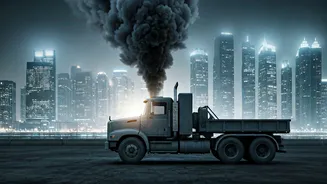Air Quality Declines
The air quality in Delhi has recently dipped, prompting action from the authorities. The deterioration in air quality has led to a declaration of 'poor'
air quality. This announcement signals a need for immediate intervention to protect public health. The description of 'poor' air quality is a key indicator of the current state, prompting the need for effective measures to improve environmental conditions. This information forms the basis for the enforcement of new regulations. The level of pollution has reached a critical stage, according to the authorities, making it necessary to implement immediate regulations. This status indicates the urgency of the situation and the immediate need to address the high pollution levels.
Truck Ban Implemented
In response to the declining air quality, a significant decision has been made. A ban on older, non-Delhi-registered trucks has come into effect. The focus of this action is on the city's borders, where the enforcement of these restrictions will be most visible. This is a crucial step that has been taken to regulate traffic and address the causes of pollution. The regulations, aimed at reducing emissions, were put into force with the goal of improving air quality, particularly around the city's boundaries. This measure has been enacted to help lower pollution levels and provide cleaner air.
Border Restrictions Defined
The implementation of the truck ban concentrates on the borders of Delhi. The restrictions have been established along the city's boundaries, where they can be effectively implemented. This approach will involve the active monitoring of vehicle entries to prevent the prohibited vehicles from entering. Authorities will be monitoring and managing the flow of trucks. The placement of these restrictions is strategic to cover all points where trucks enter the city. The objective of such concentrated action is to minimize pollution from these vehicles and assist in improving air quality.














